Jurisdiction of the Tax Court in a Refund Litigation
When you receive a statutory notice of deficiency from the IRS, you can file for a deficiency tax litigation or a refund tax litigation proceeding. Typically, refund jurisdiction is limited to the district courts and Court of Federal Claims. However, the Tax Court generally has jurisdiction over deficiency litigations. In some circumstances, the Tax Court may also have jurisdiction over refund litigation as well. The advantages and disadvantages of filing a refund litigation versus a deficiency litigation should be considered, and Tax Court jurisdiction over the matter may play a role in the decision as well.
When the Tax Court gains jurisdiction over a refund litigation, it is generally for the limited purpose of determining the amount of an overpayment when there is a finding that no deficiency exists and the taxpayer made an overpayment. Jurisdiction in Tax Court may also extend to determine an overpayment of additions to tax not subject to deficiency procedures, as long as the Tax Court already has the ability to redetermine the deficiency on a tax. The standard was elucidated in Judge v. Commissioner, where the taxpayer agreed to a tax deficiency following an audit but disagreed with certain additions to tax that the IRS determined to exist. As a result, the IRS issued a deficiency notice to the taxpayer and the taxpayers placed the additions to tax in controversy. Even though additions to tax are not subject to the deficiency procedures, the Tax Court was granted jurisdiction over the overpayments of additions to tax. Although the term “overpayment” has not been defined statutorily, it has been administratively interpreted to include “any interest, additions to tax or additional amount.”
Jurisdictional Limitations that Apply to Refund Litigation in Tax Court
The ability of the Tax Court to determine the amount of overpayment in refund litigation is subject to three special jurisdictional limitations. First, the Tax Court may only make such a determination after the taxpayer has received a statutory notice of deficiency from the IRS. Secondly, the Tax Court may determine an overpayment if the taxpayer could have filed a timely refund on or before the date the statutory notice of deficiency was mailed, even if the taxpayer did not in fact file the refund claim. Third, the Tax Court can determine an overpayment if a timely claim for refund was filed before the mailing of the statutory notice of deficiency, and any of the following conditions exists:
- The claim for refund had not been disallowed before the statutory notice of deficiency mailing date;
- A timely refund claim could have been filed as of the date of the mailing of the statutory notice of deficiency; or
- The taxpayer instituted a refund suit before the statutory notice of deficiency mailing date and within the time period allowed for under IRC § 6532.
Two-Year Lookback Rule for Refund Litigation in Tax Court
Although the Internal Revenue Code allows for the recovery of some overpayment in the Tax Court, there are limitations to the amount of overpayment that the taxpayer can recover. Under IRC § 6512(b)(3)(B), the Tax Court may obtain jurisdiction for an overpayment determination if the refund claim could have been filed as of the date of the statutory notice of deficiency. When Tax Court jurisdiction is based on this provision, there is a limitation on the amount that the taxpayer can recover under the two year “lookback” rule of IRC § 6511(b)(2)(B). The lookback rule limits the amount of recovery to the amount paid by the taxpayer in the two years prior to the filing of the refund claim. This situation typically occurs when taxes are withheld from the income of an individual taxpayer, and the taxpayer either files a late return or fails to file a return altogether.
Tax Court Jurisdiction to Order Refund of Overpayment
If the Tax Court renders a decision in a refund litigation ordering a refund, the IRS will typically abide by the order and issue the refund without any action required on the part of the taxpayer. In some occasions, however, the taxpayer may have to take affirmative action in order to actually get the refund. In those cases, the Tax Court has jurisdiction to order the refund determined by the court. The limitation to this option is that the taxpayer must file a motion for an order to refund in the Tax Court prior to the expiration of 120 days after the Tax Court’s decision.
How a Tax Attorney Can Help with Your Tax Litigation
If you are contemplating a refund litigation, then you must consult with an experienced tax attorney. San Diego Tax Attorney William D. Hartsock has been successfully helping clients with tax issues since the early 1980s. Mr. Hartsock offers free consultations with the full benefit and protections of attorney client privilege to help people clearly understand their situation and options based on the circumstances of their case. To schedule your free consultation simply fill out the contact form found on this page, or call (858) 481-4844.



Comments (0)